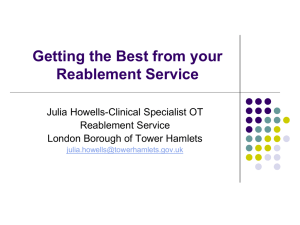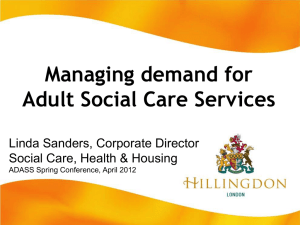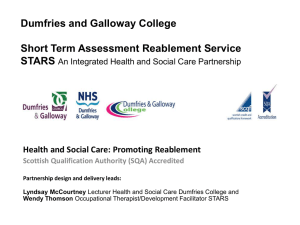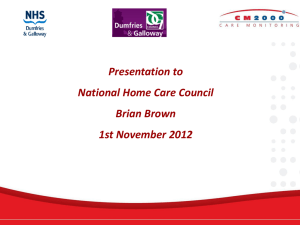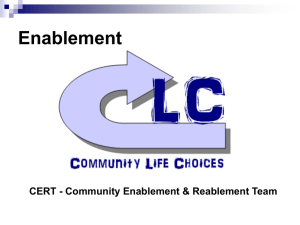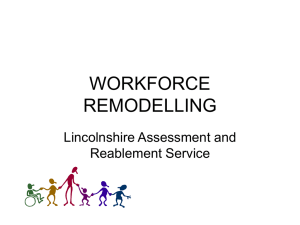Essex CC Reablement policy
advertisement
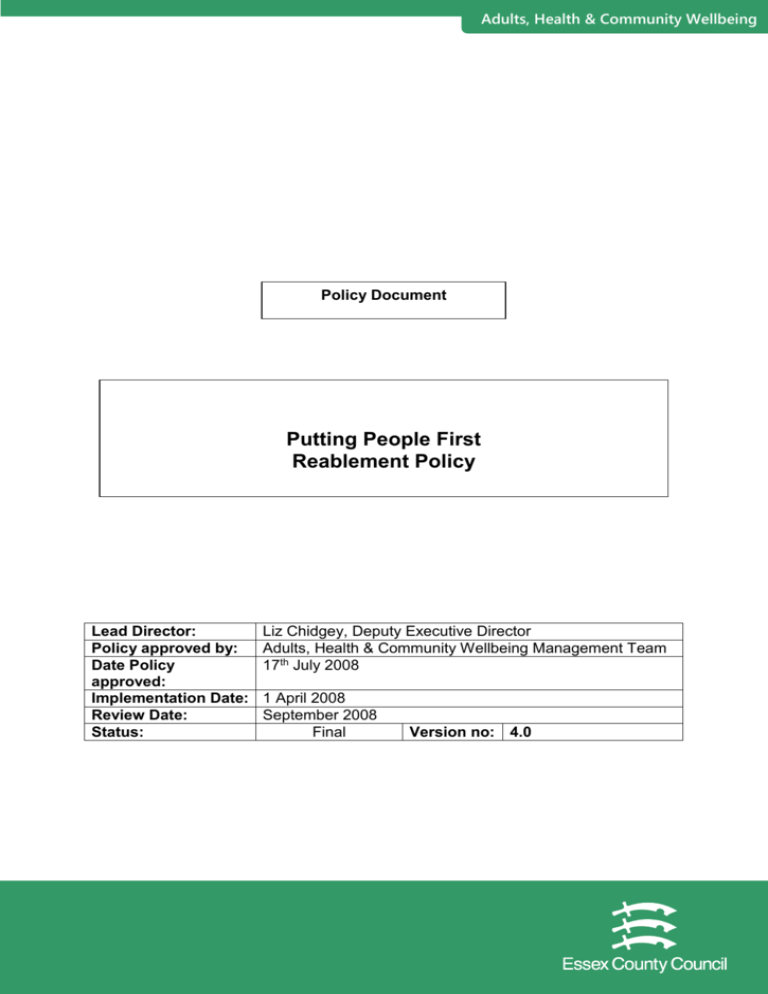
Adults, Health & Community Wellbeing Policy Document Putting People First Reablement Policy Lead Director: Policy approved by: Date Policy approved: Implementation Date: Review Date: Status: Liz Chidgey, Deputy Executive Director Adults, Health & Community Wellbeing Management Team 17th July 2008 1 April 2008 September 2008 Final Version no: 4.0 Adults, Health & Community Wellbeing Document Control Sheet Title of Policy: Putting People First: Reablement Policy Purpose of Policy: To implement reablement support for service users of adult social care in Essex. Operational policy Type of Policy: Target Audience: Adult Social Care Practitioners and Managers, especially those involved in assessment, care management or management or delivery of the reablement service. 1 April 2008 Implementation Date: Action required: Adoption of this policy as the framework for provision of the reablement service. n/a This policy supersedes: This policy should be read alongside: SDS Strategic Policy Lead Director: Liz Chidgey, Deputy Executive Director, Adults, Health & Community Wellbeing Policy Lead / Author: David Williams / Ethan Tucker Project Team: Karen Wright, Jonathan Matthews, Amanda Julian, Anna Casbolt, Ron Hiller, Valerie Russell, Helen Terry Page 2 Adults, Health & Community Wellbeing Putting People First Reablement Policy Policy statement 1. Reablement focuses on maximising people’s long-term independence, choice and quality of life, while at the same time attempting to minimise the requirement for ongoing support. Through achieving these goals, the policy seeks to reduce the wholelife cost of support, by applying resources at the early stages of a service user’s recovery process in an attempt to support independent living and delay or reduce the need for ongoing support. 2. The aim of this policy document is to implement a short term community reablement scheme in Essex. The scheme will provide services for people with declining physical and/or mental health to foster wellbeing by helping them to accommodate their condition by learning or re-learning the skills necessary for all the activities of daily living and by regaining the confidence to perform these skills. 3. The objectives of this policy are to improve outcomes for service users, to promote service users’ independence and to increase the potential for regaining and sustaining skills. 4. The reablement scheme is a part of the Putting People First approach towards social care provision, and comes within the overarching policy on self-directed support (SDS), sharing the same goal of promoting the independence, health and wellbeing of service users, while improving the choice and control of support offered to service users. Definition 5. The Department of Health’s definition of reablement is:1 ‘the use of timely and focused intensive therapy and care in a person’s home to improve their choice and quality of life, so that people can maximise their long term independence by enabling them to remain or return to live in their own homes within the community. This approach focuses on reabling people within their homes … so they achieve their optimum stable level of independence with the lowest appropriate level of ongoing support care’. 6. Reablement is also defined as one of three partially overlapping forms of social care (see over):2 Page 3 Adults, Health & Community Wellbeing PREVENTION Services for people with declining physical or mental health to help them avoid unplanned or unnecessary admissions to hospital or residential care. This can include short-term emergency interventions as well as longer term low-level support. REHABILITATION Services to people with declining physical or mental health to help them achieve optimum independence. REABLEMENT Services for people with declining physical or mental health to help them self manage their condition by learning or re-learning the skills necessary for daily living. Scope and exclusions 7. The reablement team will work with all adult service users who are residing in Essex and eligible for support in line with current Essex County Council eligibility criteria for Fair Access to Care Services. The reablement scheme will include those people where it is clear from the outset that short term, reablement focused services would be beneficial. The scheme will also include service users with no fixed abode provided they are deemed eligible.3 The majority of reablement scheme participants will likely be the adults leaving hospital or emergency interventions to prevent admission but adults meeting the criteria, who are as yet unknown to Adult Social Care will also be included. 8. All of the individuals included within the above groups will be assessed for suitability for the reablement scheme and, if appropriate, will be included within the reablement programme for a period of up to six weeks. Regulatory and policy context 9. The regulatory and policy framework governing adult social care in Essex is in a period of transition. National and local governments are in the process of moving towards a new model of care provision with a greater level of personal control for service users in most cases. Parliament makes the statutory framework, while the Department of Health generates its guidance, policy and secondary legislation. 10. At the national level the Government, through the Department of Health, sets the strategic direction of adult social care in England and provides the legal and policy framework and funding to local authorities to enable them to assess individuals who are eligible for social care support. 11. The Government has released a number of key policy documents setting the strategic direction of adult social care. Community reablement supports principles expressed in the white paper, Our Health, Our Care, Our Say,4 by facilitating delivery of care closer to home, and improved rehabilitation. Page 4 Adults, Health & Community Wellbeing 12. In July 2006 Councillor Candy, the Cabinet member with responsibility for adult social care, took a key decision to: ‘…create a unified home support service, retaining some specialist provision … for a temporary ‘intake service’ with enablement objectives. This service aims to minimise the care requirement over a maximum of six weeks, which will then be transferred to the independent sector. This will create both greater efficiencies and service user independence in line with the recent white paper, ‘Independence, Wellbeing and Choice’, and Essex County Council’s ‘Age of Opportunity [for Older People]’. 13. In December 2007 the Government, local councils, health partners, professional bodies and voluntary organisations agreed on a strategy called Putting People First to personalise care services.5 This says we should offer people the highest standards of professional expertise, care, dignity, control and the chance to make decisions for themselves. Reablement is one key aspect of implementing this strategy. 14. At the sub-national level, local authorities have direct responsibility for delivering social care services. Essex County Council is responsible for meeting local adult social care needs through the commissioning of public, private and voluntary sector providers to deliver services. Essex has a broad policy of continuous improvement of its services for people with physical and sensory impairment (the ‘Equal Lives’ five year plan, 200611).6 15. In keeping with this policy, in December 2007 the Essex County Council Cabinet considered the reablement scheme in an overview paper on the SDS project.7 The paper observed that: ‘Some people will benefit from intensive short term reablement programmes which help people to learn or relearn basic skills necessary for daily living. Such reablement programmes may be particularly applicable in the context of discharge from hospital but are also applicable under other circumstances. As well as being of great benefit to the individual, experience in other local authorities suggests that effective reablement programmes can significantly reduce the level of ongoing social care support required for many people. The County Council is currently engaged in three pilot projects with three of the five PCTs in Essex to develop an integrated approach covering rehabilitation and reablement and it is anticipated that reablement will in due course be jointly commissioned with the PCTs’ 16. A decision was made at the council managerial level to implement a reablement scheme in Essex. In December 2007 the Senior Management Team agreed that a reablement model should be included in a provider transformation business case, and that Essex should ‘aim to start [a] reablement service [provided by the Essex County Council Domiciliary Support Staff] as soon as possible’. 17. In January 2008 the discussion document Putting Essex People First,8 the council highlighted reablement in the following statement: ‘This intensive, short-term package of support can reduce people’s ongoing social care needs. Essex County Council wants to help people live at home by giving them greater Page 5 Adults, Health & Community Wellbeing choice and control over services. We also want to make sure our services keep improving and guarantee value for money for taxpayers’ 18. There are a number of key documents with direct relevance to the development of the reablement scheme in Essex listed in Appendix B. Policy background Why is reablement being implemented? 19. Reablement has been shown to help people remain in their own homes for longer when they have been affected by declining physical and/or mental health. As an example, in 2005/6 1836 people received reablement services in Leicestershire. Of these, 49.7 percent required no further homecare support, and 28.5 percent ended up with a 30 percent reduction in ongoing support needs.9 20. It is also one way in which councils can manage ever-increasing demand for domiciliary support services. There has been a steady growth in the number of domiciliary support contact hours funded by councils. At the same time the number of people supported has reduced since 1992, reflecting a shift towards supporting those with more intense needs: YEAR 1992 2001 2005 UK DOMICILIARY SUPPORT CONTACT HOURS (MILLIONS / WEEK) 1.6 2.9 3.6 21. This increase is predicted to continue, with ongoing population increases, particularly in the older age brackets. This has been predicted to lead to a 10 percent growth in high dependency cases in the five years to 2012 and a 33 percent increase in the 15 years to 2022. Increased demand for domiciliary support services has led councils to focus on those with greatest needs, and this has led to a narrowing of the criteria for accessing care services in some areas of the UK. This is likely to result in people being denied care and presenting with a higher level of need at a later stage. Reablement will attempt to prevent this occurring. 22. There are also concerns about the demographic shift that may, over time, reduce the proportion of the population that have tended to provide care and support. Guiding principles 23. The key principle underpinning the establishment of the reablement policy is the adoption of a process of early intervention and short term help with the aim of preventing the development of complex support needs at a later stage in a service Page 6 Adults, Health & Community Wellbeing user’s life. The policy is in keeping with the emphasis of the Adults, Health and Community Wellbeing Directorate Plan 2007-2010, which indicates that preventative methods should be a prominent theme of adult social care. 24. Other guiding principles informing the policy are set out below: Increased choice and control for people eligible for social care services Person-centredness: Service users should have more control and choice over their support. The role of adult social care is to help people to maintain or regain their independence, regardless of age, impairment, ethnicity or personal circumstances. Service users should have more responsibility for assessing their needs and for planning and managing their support. The role of adult social care professionals is to support service users to achieve the desired outcomes that have been identified in the support plan. Service users should have access to a full range of information, advice and services to empower them to address their social care needs themselves. Not all service users want to or are able to plan for and achieve the outcomes identified in their support plans, so they must receive assistance to do so, when necessary. Improve the quality of services Service users should be able to access a choice of high quality services and providers to enable them to benefit from tailored, high quality and good value support. Eligible service users should be provided with information, advice, assessments and appropriate support in a timely manner. Page 7 Adults, Health & Community Wellbeing Make best use of resources Prioritising prevention, early intervention and promoting greater wellbeing and independence can in many cases reduce the need for ongoing support, thus saving public money in the longer term. Policy requirements How will it operate? 25. In Essex reablement will provide intensive support to people leaving hospital to minimise the chances of re-admission, and to those new to the service who meet the eligibility criteria. The aim of this support is to increase users’ levels of independence and providing greater choice and improving their quality of life, while at the same time seeking to reduce the need for ongoing support. This is seen as an intermediate care service and therefore will not attract a charge for the period of the reablement programme, which will be up to six weeks in duration. It is for this reason that reablement is not intended to operate beyond the six week period. 26. Reablement services will be delivered by domiciliary support services, supported by reablement occupational therapists (OTs). Reablement services have been piloted in South East Essex, and implemented across Essex from 1 April 2008. The implementation has begun with the hospital discharge teams for those adults leaving hospital, and then rolling out to encompass the use of interim (IP) beds for rehabilitation purposes, and then opening up to other eligible adults new to the service. 27. The Council aims to work closely with Primary Care Trusts to develop a coordinated approach to maximise the potential benefits of reablement through alignment of PCT Intermediate Care / Rehabilitation Services with the Council Reablement Team. Joint commissioning of reablement is a long term goal. Assessment & selection 28. A process map for the reablement process is attached as Appendix A. The key stages of the process are: Referral accepted from Essex County Council or PCT Reablement assessment to be completed10 Reablement objectives and programme signed off by OT Reablement worker tasks defined; Telecare assessment completed Weekly team meetings to review service user progress At 3rd week (or earlier if appropriate) the discharge date is identified Final assessment to be completed within the final week of reablement. Review summary sent to case coordinator (an appropriately skilled worker) with a discharge recommendation Page 8 Adults, Health & Community Wellbeing Service user discharged, and transferred to other ongoing support or offered a personal budget if required. 29. Self-funders will be as eligible for reablement as those who will be seeking financial support from the Council. 30. Once a service user is assessed as being suitable for a reablement programme, an appropriately skilled worker will assign complete a reablement assessment by assigning the potential reablement service user case to one of three categories: either simple, moderate or complex in nature. Simple: one or two everyday tasks have been lost and support or guidance will be required to increase confidence and enable them to undertake ADLs independently. Moderate: two or more everyday tasks have been lost, and preventative work is needed to reduce the risk of deterioration in their condition and/or to reduce the likelihood of admission to a hospital or care home. Complex: a significant impairment, or where deterioration in the condition has been experienced and/or where complex physical need requires support to regain or improve their independence. 31. The reablement assessment will determine the level of service users’ functional ability to undertake a range of independent activities, including general mobility, transfers (e.g. toilet, chair and bed), personal care and other domestic tasks. In each of these areas service users will be assessed as either ‘independent’, independent with supervision’, independent but needing assistance’ ‘independent with difficulty’ or ‘unable to do at all’. 32. If after the initial assessment the service user is not found to be an appropriate candidate for reablement the service user’s case will be referred on to the local community team for completion of the assessment. 33. A reablement plan is agreed with the service user based on the reablement assessment. Each service user will have agreed individual outcomes to enhance their daily living skills, and reduce or eliminate the need for support packages. 34. Domiciliary Support Services will work with service users during the day assisting them to complete tasks for themselves. The emphasis will be on allowing and encouraging the individual to do the tasks themselves where appropriate, rather than having the tasks completed for them. Page 9 Adults, Health & Community Wellbeing Appendix A – Reablement programme pathway Referral Accepted via emailed COM5 from HSW and SPT Care element identified for DSS by HSW and COM5 Reablement assessment completed by Facilitator/OT Reablement assessment score sheet and objectives/outcomes completed Reablement objectives/outcomes and programme signed off by OT Reablement programme translated into reablement worker tasks. Telecare assessment completed Weekly team meeting to review service user progress with facilitators, reablement workers and OTs. At latest at 3 week review discharge date identified - SW SPT informed Reablement programme completed, scored and reviewed Review summary sent to SW with discharge recommendation SU discharged from Reablement service. SU not engaging/progress completed DSS to present to CPB for external package/personal budgets ** Self-caring Discharge COM5 from SW for external provision to CPB Page 10 Adults, Health & Community Wellbeing Appendix B – Key policy documents Legislation National Assistance Act 1948 Health Services and Public Health Act 1968 (subject to LAC (93) 10) Chronically Sick and Disabled Persons Act 1970 Race Relations Act 1976 National Health Service Act 1977 Health and Social Services and Social Security Adjudications Act 1983 Mental Health Act 1983 Disabled Persons (Services Consultation and Representation) Act 1986 National Health Service and Community Care Act 1990 Carers (Recognition and Services) Act 1995 Data Protection Act 1998 Human Rights Act 1998 Health Act 1999 Freedom of Information Act 2000 Race Relations Amendment Act 2000 Local Government Act 2000 Care Standards Act 2000 Health and Social Care Act 2001 Local Government Act 2003 Community Care (Delayed Discharges etc.) Act 2003 Carers (Equal Opportunity) Act 2004 Mental Capacity Act 2005 Disability Discrimination Act 1995 as amended by the Disability Discrimination Act 2005 Equalities Act 2006 Safeguarding Vulnerable Groups Act 2006 Mental Health Act 2007 Policy and Guidance The New Performance Framework for Local Authority and Local Authority Partnerships (2007) Building on Progress Public Services (2007) Putting People First (2007) Strong and Prosperous Communities: Local Government White Paper (2006) Our Health, Our Care, Our Say: a new direction for community services (2006) Independence, Well-being and Choice (2005) Improving the Life of Disabled People (2005) Fairer Access to Care Guidance (2002) Valuing People (2001) National Service Framework for Older People A Stronger Local Voice National Carers Strategy Independent Living Strategy Page 11 Adults, Health & Community Wellbeing Independent Living (1983) Fund Code of Practice for the Mental Capacity Act 2005 Local Authority Circulars LAC (2008) 1 Transforming Social Care LAC (2004) 24 Community Care Assessment Directions LAC (2003) 14 Changes to Local Authorities Charging Regime for community equipment and intermediate care services LAC (2001) 32 Fairer Charging Policies for Home Care and Other non-residential Social Services – Guidance for Councils with Social Care Responsibilities LAC (2001) 6 Better Care Higher Standards LAC (93) 7 Ordinary Residence LAC (93) 10 LAC (92) 15 Social Care for Adults with Learning Disabilities Notes 1 Source: Essex County Council social worker information pack for the reablement service. Modified from document at www.csed.csip.org.uk/silo/files/hradiscdocfinalhh.pdf 3 s.47 of the National Health Service and Community Care Act 1990 sets out the duty for a local authority to assess a person in their area who may be in need of services. The services are under s.29 of the National Assistance Act 1948 or s.2 of the Chronically Sick and Disabled Persons Act 1970, while older people can be given services under Schedule 8 of the National Health Service Act 1977. 4 www.dh.gov.uk/en/Healthcare/Ourhealthourcareoursay/index.htm 5www.dh.gov.uk/en/Publicationsandstatistics/Publications/PublicationsPolicyAndGuidance/DH_081118?IdcS ervice=GET_FILE&dID=156660&Rendition=Web 6 www.essexcc.gov.uk/vip8/ecc/ECCWebsite/content/binaries/documents/equal_live_consultation.pdf 7 http://comad.essexcc.gov.uk/ComadDocuments/Decision/3755/Self%20Directed%20Support.pdf 8 www.essexcc.gov.uk/vip8/ecc/ECCWebsite/content/binaries/documents/SocialCareConsultation.pdf 9 www.csed.csip.org.uk/silo/files/csed-workshop-leics-modelppt.ppt (slide 21) 10 Complex assessments will be made by OTs; simple and moderate assessments will be made by trained supervisors with OT support. 2 Page 12
